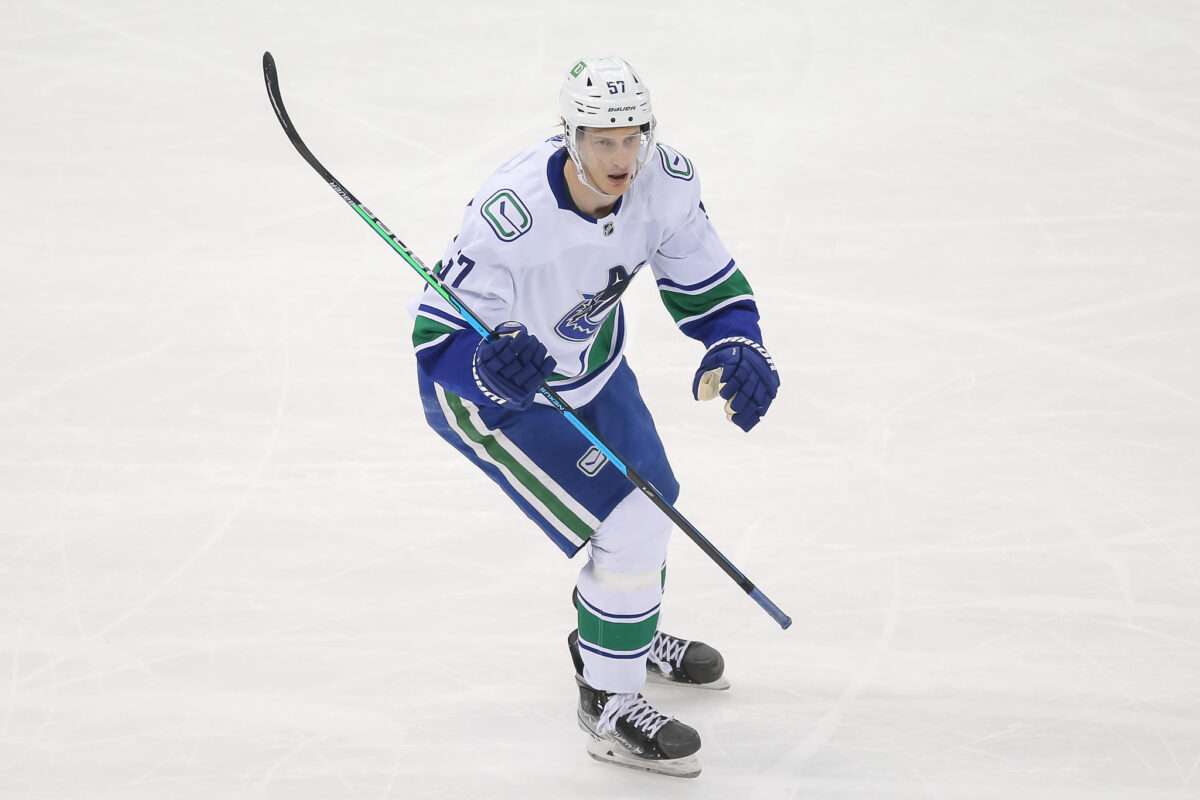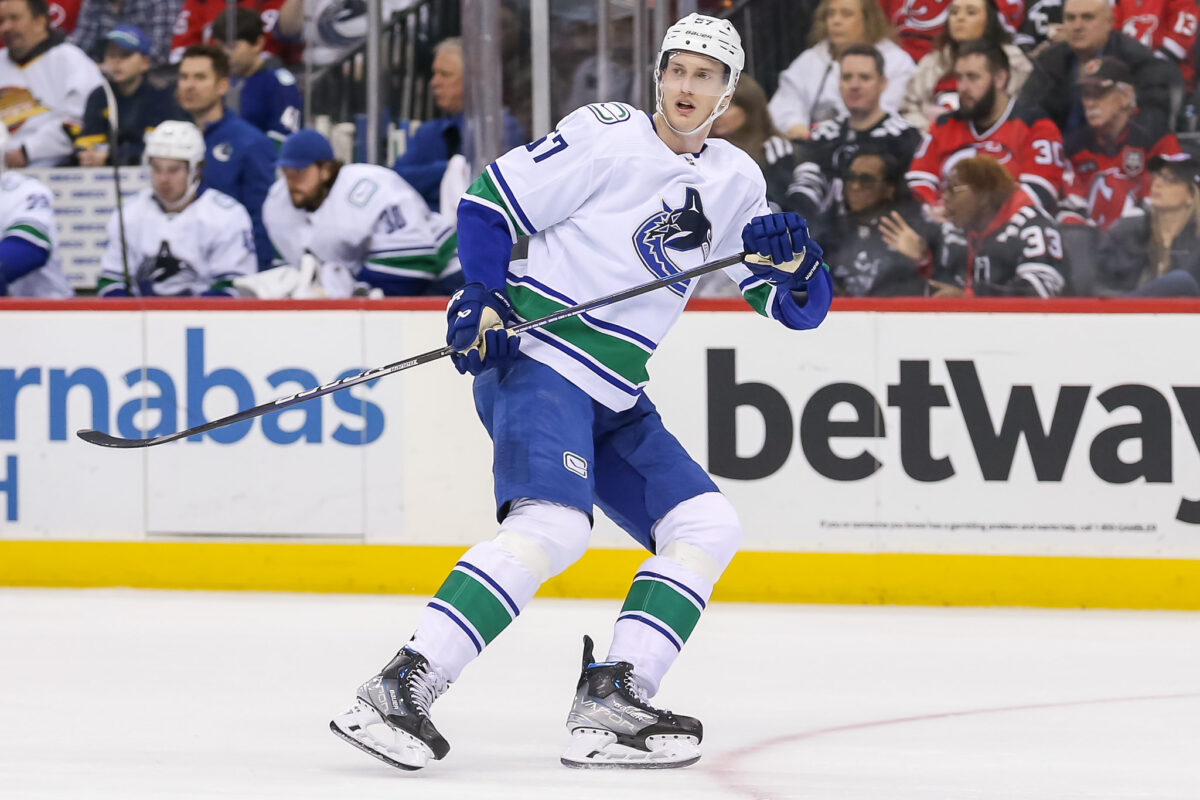Welcome to the Vancouver Canucks 2022-23 report card series. In this series, we at The Hockey Writers look back at each Canucks player from the past season, break down how their campaign went and assign a letter grade reflective of their overall performance. This edition will focus on defenseman Tyler Myers.
Myers’ Offensive Decline
Myers was once known as a physical defenseman capable of providing great offense from the blue line. Since joining the Canucks, it is safe to say those days are officially over. In 78 games this season, Myers only scored one goal and 16 assists for 17 points, which is good for a 0.21 points-per-game (P/G) pace. This season, statistically, proved to be the worst offensive season in his career, surpassing his recent low from last season, when he also scored at a 0.21 P/G rate. The difference is marginal, as the difference requires going into the third-decimal placement. Regardless, a player’s offense continually declining is not a promising sign. While Myers had back-to-back bad statistical seasons, this year, the team saw a catastrophic fall off regarding his analytics.
Related: Canucks 2022-23 Report Cards: Vitali Kravtsov
Myers fell off a cliff analytically this season. The defenseman finished in the 10th percentile in offensive wins-above-replacement (WAR) for all defensemen this season, meaning over 90 percent of all defensemen had better offensive seasons this year (From JFresh’s paid Patreon subscription service). His Corsi For was only 41 percent, four percent worse than last year. Additionally, the number of his expected goals was a bleak 4.9. By every metric, Myers had an abysmal offensive season for the Canucks. He can potentially turn it around, but it is highly doubtful due to his age and lack of foot speed.
Myers’ Defensive Play with Canucks
Myers improved his defensive play with the Canucks this season, although going from a below-average defender to an average one still does not warrant $6 million annually. Myers had one of his best seasons as a Canuck if one only looks at his defensive zone play, but even then, it is not saying much. He had a plus/minus of minus-16 and a giveaway-takeaway ratio of 25-48. Forty of the 48 giveaways came in the defensive end. He led the team in giveaways by 20, the next closest being Ethan Bear with 28. Bear also trailed in defensive zone giveaways, only managing 24 to Myers’ 40. His defensive WAR did reach above the 50 percentile, but his counting stats are too egregious to ignore.

To go along with the so-so-to-bad statistics, Myers also had a career-high in penalty minutes with 76 this season. The fun trivia question speaks to his inability to stay out of the penalty box, as despite being an average defender, becoming a penalty liability in the process negates any good he can do during the game. The defensive numbers are an actual improvement from last season, statistically and analytically. Improvement in any way is good, and Myers did improve on his end, but going from liability to occasional liability is not good enough.
Myers’ Future with the Canucks
Myers has one year remaining on the five-year, $30 million contract he signed in 2019 with the Canucks. His $6 million cap hit makes him a prime trade candidate this offseason as the Canucks look to create cap space to widen their competitive window. Doing so will be challenging, as Myers has a modified no-trade clause. Additionally, the cost for a team to take on his high salary would cost an abundance of assets. With cheaper options to move for the Canucks, such as Conor Garland or Brock Boeser, Myers may remain on the team.

Trading Myers, while freeing up cap space, would make the Canucks defense even worse. Despite all his faults, he is an NHL-calibre defenseman for the team, playing tough second-paring minutes. Filip Hronek and Bear should push him down to the third pair, and while paying $6 million for a bottom-pairing defenseman is a horrible business practice, if the cost is too high to move Myers, keeping him is better than nothing. In an isolated, low-minute role, Myers could prove effective, but his salary warrants more of a minute-munching defenseman than he can offer.
Final Grade for Tyler Myers: C-
Myers’ defensive improvement from last year helps boost his grade to an average one. If he is rated purely on his worth based on his contract, then the grade would be severely worse. His minor improvement defensively was a surprise for the Canucks, helping steady a shaky blue line, even if minuscule. His horrid offensive results tank his grade, as Myers, a former two-way to offensive d-man, can no longer drive offense as he did, even comparing just to last season. If he stays on the Canucks, expect an even worse offensive output while hoping for similar defensive results; however, the 2023-24 Canucks defense corps does not look too bright.
